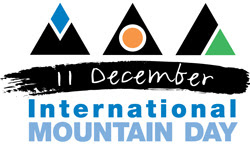
Every year, International Mountain Day is observed with a different theme relevant to sustainable mountain development. The International Mountain Day 2006 with its theme of "Managing Mountain Biodiversity for Better Lives" promotes awareness and action for the sustainable management of mountain biodiversity for the benefit of all.(...)
(para benefício de todos...é assim tão difícil de entender???)
Managing mountain biodiversity for better lives

Mountains are storehouses of global biodiversity. They support approximately one quarter of terrestrial biological diversity, with nearly half of the world's biodiversity hot spots concentrated in mountains. Mountain biodiversity supports the livelihoods of mountain populations and provides basic ecosystem services, such as fresh water, timber, medicinal plants and recreation for the surrounding lowlands and their increasingly urbanized areas.
Mountains are unique islands of biodiversity, often exceeding the diversity of adjacent lowlands. Isolated mountains are often rich in endemic species, i. e. plants and animals that occur nowhere else. Mountain areas have also acted as refuges from environmental change and are also characterized by moderate disturbances such as landslides, avalanches and grazing, which often increase biological richness and habitat diversity.
Mountains are storehouses of the genetic diversity that helps feed the world. Several crops - maize, potatoes, barley, sorghum, tomatoes and apples - and a large portion of domestic animals - sheep, goats, yaks, llama and alpaca - originated in mountains. Other crops - wheat, rice, beans, oats, grapes, oranges and rye - found new homes in the mountains and evolved into many different varieties. Furthermore, waterbodies in mountains also harbour fish.
But biodiversity is not only about plants, animals and micro- organisms, and their ecosystems - it is about mountain people and their need for food security, medicines, fresh air and water, shelter, and a clean and healthy environment in which to live; it is about their cultural and social traditions, environmental knowledge and habitat adaptations. Mountain populations have developed highly diverse systems of land use which are locally adapted and which feature a great variety of site- specific plants and animals. This heritage represents a global asset that needs to be managed for the benefit of humankind and future generations. (...)
in http://www.fao.org/mnts/intl_mountain_note_en.asp#rise
Sem comentários:
Enviar um comentário